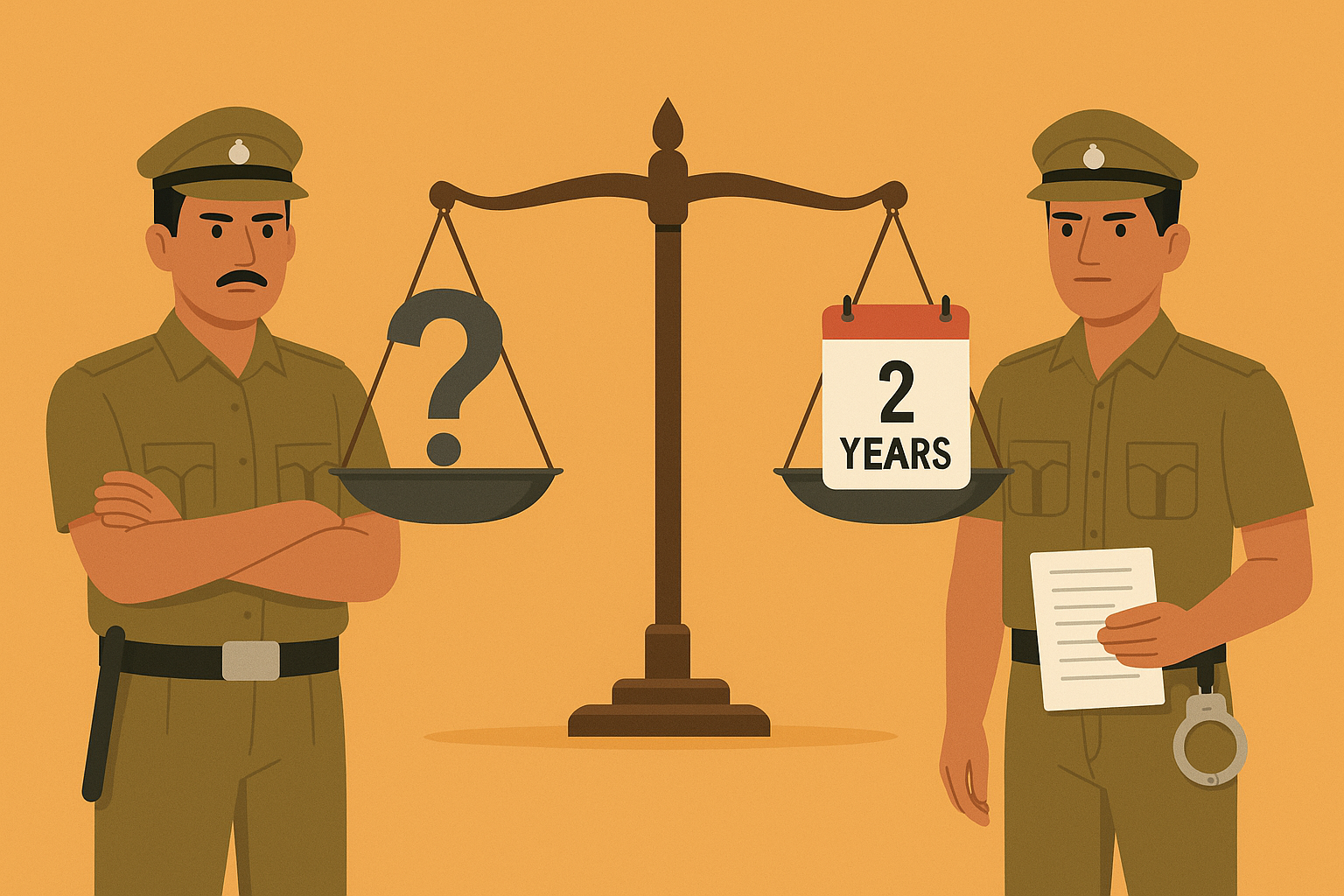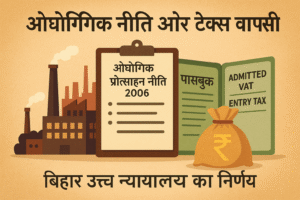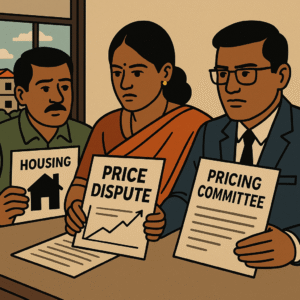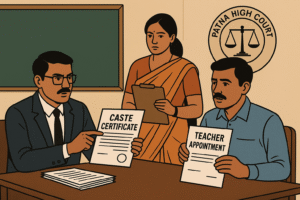The petitioner, a police “Havildar” posted at a district police station, approached the Patna High Court challenging departmental orders that (i) placed him under suspension, (ii) withheld two annual increments for two years, and (iii) denied him salary for the suspension period except subsistence allowance. The impugned orders were passed by different supervisory police authorities through office memoranda dated 05.11.2017, 24.07.2018, and 13.03.2019. The writ petition was heard and allowed by the Patna High Court on 18.02.2021, with the Court quashing all three orders and reminding the authorities to act in accordance with law.
On the facts, the incident arose from a violent public protest at the police station on 20.11.2017 in the backdrop of a murder. According to the petitioner, he remained inside the premises with the Station House Officer as instructed, while a deputed Executive Magistrate, upon arrival with additional force, went to the rooftop and fired to control the situation, which unfortunately resulted in a casualty. A disciplinary proceeding followed: eight officials were suspended for the same episode; ultimately three were exonerated while five—including the petitioner—were held guilty. The petitioner also asserted that no eye-witness was examined against him and that he was not afforded an opportunity of cross-examination, rendering the orders ex parte and unlawful.
The State defended the action, stating that the appellate authority had considered all aspects. The Court called for the records of all eight suspended personnel, examined them in Court, and returned them after perusal. This record-based scrutiny became central to the Court’s conclusion that similarly placed officials received inconsistent outcomes without a rational basis.
In its analysis, the Court emphasized Article 14 of the Constitution—equal treatment in State action—and held that there cannot be “two yardsticks” of punishment on the same set of allegations. If the incident was common and the charges were common, the authorities needed to disclose a cogent, non-arbitrary basis for exonerating three officers while punishing five others. The Court found the administrative action to be infected with arbitrariness and “hostile discrimination,” thereby failing the touchstone of fairness and reasonableness that Article 14 demands in executive/administrative decisions.
The Court also faulted the direction denying all salary for the suspension period (other than subsistence allowance). It held that the disciplinary authority must issue a separate show-cause notice to the delinquent specifically on “how the suspension period is to be treated,” in terms of Rule 97(3) of the Bihar Service Code. Absent such a notice and opportunity, the denial of pay was unsustainable. On these grounds, the High Court allowed the writ petition and quashed all impugned orders, expecting the authorities to take further steps strictly in accordance with law.
Overall, the judgment underscores two well-settled administrative law principles: parity and non-arbitrariness in disciplinary action among similarly situated employees, and the mandatory observance of procedural safeguards before deciding the financial consequences of suspension.
Significance or Implication of the Judgment (For general public or government)
This decision is significant for police personnel and civil servants across Bihar. First, it reiterates that disciplinary authorities must apply a single, rational yardstick when multiple employees are charged for the same incident. Differentiated outcomes are permissible only if supported by relevant distinctions that are recorded and explained. Without this, decisions risk being struck down as arbitrary under Article 14.
Second, the judgment clarifies the treatment of the suspension period. Authorities cannot automatically forfeit salary for the suspension interval. A separate show-cause notice is required under Rule 97(3) of the Bihar Service Code, giving the employee an opportunity to explain why the period should be treated as duty or otherwise. This is crucial for livelihood and service benefits, as the classification of the suspension period often affects pay, increments, seniority, and pension calculations.
Third, the ruling amplifies natural justice in departmental inquiries: where an employee complains of not being allowed to cross-examine or of ex parte handling, the authority must address these issues in a reasoned manner. Failure to do so vitiates the process.
For government departments, this case is a cautionary note: maintain consistent standards across co-delinquents, document reasons for differential treatment, and ensure all statutory steps—like separate notices regarding pay for suspension periods—are complied with. For the public, it reinforces that courts will intervene when administrative action departs from fairness, even within the internal realm of police discipline.
Legal Issue(s) Decided and the Court’s Decision with reasoning
- Whether similarly placed co-delinquents can receive unequal disciplinary outcomes without a rational basis.
Decision: No. The Court held that “there cannot be two yardsticks of punishment on common allegation.” Where eight officials were suspended for the same incident and three were exonerated while five were punished, the authorities failed to justify the differential treatment. Such inconsistency violated Article 14’s guarantee of equality and fairness in State action. - Whether denying all salary for the suspension period (except subsistence allowance) without a distinct notice is lawful.
Decision: No. The disciplinary authority must issue a separate show-cause in terms of Rule 97(3) of the Bihar Service Code before deciding the treatment of the suspension period. In the absence of such notice, the denial of pay was illegal. - Whether the disciplinary process complied with principles of natural justice.
Decision: The Court took note of the petitioner’s contention that he was not allowed to cross-examine and that findings were ex parte. Combined with the unjustified disparity among co-delinquents, the process failed the standards of fair play and reasonableness under Article 14, warranting judicial interference.
Judgments Referred by Parties (with citations)
- Petitioner relied on a Patna High Court judgment dated 10.02.2010 in C.W.J.C. No. 17354 of 2009, to contend that the departmental proceeding was vitiated and that equality principles under Article 14 should apply to co-delinquents. (Full citation to be verified.)
Case Title
Shailendra Thakur @ Shailendra Kumar Thakur v. State of Bihar & Ors.
Case Number
Civil Writ Jurisdiction Case No. 25288 of 2019.
Citation(s)
2021(2) PLJR 248
Coram and Names of Judges
Hon’ble Mr. Justice Anjani Kumar Sharan. (Oral Judgment dated 18.02.2021; uploaded on 23.02.2021.)
Names of Advocates and who they appeared for
- For the petitioner: Mr. Indu Bhushan, Advocate; Mr. Narsingh Tanti, Advocate.
- For the State/respondents: Md. N. H. Khan, SC-1; Md. Irshad, AC to SC-1.
Link to Judgment
MTUjMjUyODgjMjAxOSMxI04=—ak1–OBaYxC–ak1–B30=
If you found this explanation helpful and wish to stay informed about how legal developments may affect your rights in Bihar, you may consider following Samvida Law Associates for more updates.








